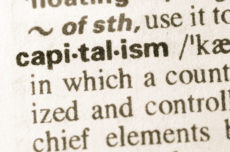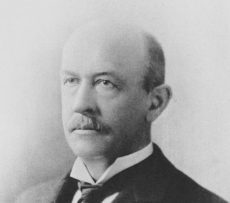I call him the Forgotten Man. Perhaps the appellation is not strictly correct. He is the man who never is thought of. He is the victim of the reformer, social speculator, and philanthropist, and I hope to show you before I get through that he deserves your notice both for his character and for the many burdens which are laid upon him….
In the definition the word “people” was used for a class or section of the population. It is now asserted that if that section rules, there can be no paternal, that is, undue, government. That doctrine, however, is the very opposite of liberty and contains the most vicious error possible in politics. The truth is that cupidity, selfishness, envy, malice, lust, vindictiveness, are constant vices of human nature. They are not confined to classes or to nations or particular ages of the world. They present themselves in the palace, in the parliament, in the academy, in the church, in the workshop, and in the hovel. They appear in autocracies, theocracies, aristocracies, democracies, and ochlocracies all alike. They change their masks somewhat from age to age and from one form of society to another. All history is only one long story to this effect: men have struggled for power over their fellow-men in order that they might win the joys of earth at the expense of others and might shift the burdens of life from their own shoulders upon those of others. It is true that, until this time, the proletariat, the mass of mankind, have rarely had the power and they have not made such a record as kings and nobles and priests have made of the abuses they would perpetrate against their fellow-men when they could and dared. But what folly it is to think that vice and passion are limited by classes, that liberty consists only in taking power away from nobles and priests and giving it to artisans and peasants and that these latter will never abuse it! They will abuse it just as all others have done unless they are put under checks and guarantees, and there can be no civil liberty anywhere unless rights are guaranteed against all abuses, as well from proletarians as from generals, aristocrats, and ecclesiastics.…
It is plain enough that the Forgotten Man and the Forgotten Woman are the very life and substance of society. They are the ones who ought to be first and always remembered. They are always forgotten by sentimentalists, philanthropists, reformers, enthusiasts, and every description of speculator in sociology, political economy, or political science. If a student of any of these sciences ever comes to understand the position of the Forgotten Man and to appreciate his true value, you will find such student an uncompromising advocate of the strictest scientific thinking on all social topics, and a cold and hard-hearted skeptic towards all artificial schemes of social amelioration. If it is desired to bring about social improvements, bring us a scheme for relieving the Forgotten Man of some of his burdens. He is our productive force which we are wasting. Let us stop wasting his force. Then we shall have a clean and simple gain for the whole society. The Forgotten Man is weighted down with the cost and burden of the schemes for making everybody happy, with the cost of public beneficence, with the support of all the loafers, with the loss of all the economic quackery, with the cost of all the jobs. Let us remember him a little while. Let us take some of the burdens off him. Let us turn our pity on him instead of on the good-for-nothing. It will be only justice to him, and society will greatly gain by it. Why should we not also have the satisfaction of thinking and caring for a little while about the clean, honest, industrious, independent, self-supporting men and women who have not inherited much to make life luxurious for them, but who are doing what they can to get on in the world without begging from anybody, especially since all they want is to be let alone, with good friendship and honest respect. Certainly the philanthropists and sentimentalists have kept our attention for a long time on the nasty, shiftless, criminal, whining, crawling, and good-for-nothing people, as if they alone deserved our attention.…
What the Forgotten Man really wants is true liberty. Most of his wrongs and woes come from the fact that there are yet mixed together in our institutions the old mediaeval theories of protection and personal dependence and the modern theories of independence and individual liberty. The consequence is that the people who are clever enough to get into positions of control, measure their own rights by the paternal theory and their own duties by the theory of independent liberty. It follows that the Forgotten Man, who is hard at work at home, has to pay both ways. His rights are measured by the theory of liberty, that is, he has only such as he can conquer. His duties are measured by the paternal theory, that is, he must discharge all which are laid upon him, as is always the fortune of parents. People talk about the paternal theory of government as if it were a very simple thing. Analyze it, however, and you see that in every paternal relation there must be two parties, a parent and a child, and when you speak metaphorically, it makes all the difference in the world who is parent and who is child. Now, since we, the people, are the state, whenever there is any work to be done or expense to be paid, and since the petted classes and the criminals and the jobbers cost and do not pay, it is they who are in the position of the child, and it is the Forgotten Man who is the parent. What the Forgotten Man needs, therefore, is that we come to a clearer understanding of liberty and to a more complete realization of it. Every step which we win in liberty will set the Forgotten Man free from some of his burdens and allow him to use his powers for himself and for the commonwealth.
 Caroline F. Pearson of the Avalere consulting firm has surveyed states which have already published 2017 Obamacare exchange premiums. Among eight states and the District of Columbia, the average requested rate hike is 16 percent for popular Silver plans:
Caroline F. Pearson of the Avalere consulting firm has surveyed states which have already published 2017 Obamacare exchange premiums. Among eight states and the District of Columbia, the average requested rate hike is 16 percent for popular Silver plans: May 29 marks the centennial of
May 29 marks the centennial of  A few weeks ago, Medicare
A few weeks ago, Medicare 
 On Sunday night, my husband and I sat down to watch comedian John Oliver’s show “Last Week Tonight.” The news satire program is a guilty pleasure for the both of us. As the host, Oliver often brings humor to many otherwise (rightfully) dreadful topics.
On Sunday night, my husband and I sat down to watch comedian John Oliver’s show “Last Week Tonight.” The news satire program is a guilty pleasure for the both of us. As the host, Oliver often brings humor to many otherwise (rightfully) dreadful topics. Back in July 2014, over at another blog, I
Back in July 2014, over at another blog, I 
 Universal preschool is (again) making headlines as a cure for what ails us.
Universal preschool is (again) making headlines as a cure for what ails us.  One of the leading claims proponents made for establishing a US Department of Education was that state and local citizens simply couldn’t be trusted with education.
One of the leading claims proponents made for establishing a US Department of Education was that state and local citizens simply couldn’t be trusted with education.




